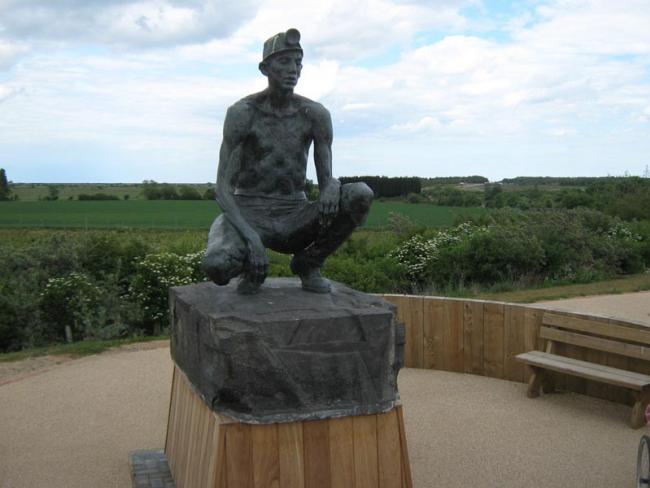
The Waiting Miner statue commemorates the hard work and sacrifices made by Kent miners. It is now sited near Betteshanger, on the approach to the Kent Mining Museum. David Anstiss via Geograph (CC BY-SA 2.0).
Employers have always tried to make strikes illegal and ineffective. One group of workers stood up to intimidation in the middle of war…
Whenever workers take effective action to defend wages and conditions, as they are now, employers look to hamper and thwart them. Aided by the state, the threat of legal action and banning strikes is never far behind the employers’ universal cry of being unable to afford pay rises.
Trade unions were born and grew in conditions of illegality. Today, unions face innumerable obstacles to industrial action, and yet they fight. One remarkable example, the 1942 strike at Betteshanger colliery in Kent at the height of the second world war, shows that legislation does not prevent industrial conflict.
Betteshanger, the largest mine in the Kent coalfield, was opened in 1927. Deal, a small seaside town, was never going to supply the 1,500 or so miners the huge pit required. Instead they came from other parts of Britain, some from exhausted coalfields, and many who were blacklisted in their own areas because of their union activity during the 1926 General Strike.
Illegal
Wartime legislation sought to outlaw anything which impeded maximum production – including coal mining as the key source of energy for industry. Most notably Order 1305 declared strikes illegal if not submitted to a National Arbitration Panel within 21 days.
The owners of the colliery opened up a new coalface, No 2 Face, in November 1941. The new face was more challenging and far less productive than the existing Eastern Face. The seam was at times only 2 feet high, requiring men to work on their knees. Equipment had to be constantly repaired, further eating into production time.
Consequently the miners were unable to meet the previously agreed and achieved quotas. The management accused the men of operating a go-slow. They refused to acknowledge the difficulties in the new seam and ignored the men’s grievances over reductions in pay.
‘Prosecution did not cow the men, quite the opposite…’
Management sent for an arbitrator, who declared the target for No 2 Face was achievable. The miners disputed his finding, pointing out, among other things, that he could hardly have done a thorough inspection – as he had fainted almost as soon as he entered the pit, and was then brought out.
Nevertheless the owners insisted they would pay only piecework rates for coal produced. This incensed the miners as it went against an industry-wide agreement that guaranteed a minimum wage. The severely reduced wages were imposed on 8 January 1942. The men struck the following day.
The importance of the colliery for war production meant the strike attracted much press attention. Mostly unfavourable, newspapers echoed the company’s declaration that the miners were unpatriotic for disrupting the war effort.
Angered
This angered the miners further. They had maintained production while being on the front line of bombing raids from Germany, even when the mine buildings themselves were hit. And many of them were volunteering for ancillary roles, such as air raid wardens, after their shifts ended. Some wondered why the owners had closed a productive seam for one difficult to work.
The government decided to prosecute the striking men. A trial was arranged at Canterbury to begin on 23 January. If this display of legal authority was meant to cow the men it had the opposite effect. They marched to the court with their wives and children and bands playing.
At the trial, the three branch officials involved faced civil charges for breach of contract as well as criminal charges relating to Order 1305. The civil charges came first, focusing heavily on the alleged lack of patriotism. But before the case against this trumped up charge could be made, the prosecution dropped it, robbing the miners of an opportunity to respond.
The criminal case concentrated on the legal nicety of whether 21 days’ notice had been given – and not the cause of the dispute. Unsurprisingly the officials were found guilty and sentenced to prison – one of them for two months and the two others for one month.
The 35 men working on No 2 Face were fined £2, and over a thousand others were fined £1 for supporting them. All faced imprisonment if the fines were not paid.
The strike had taken a heavy toll on the miners and their families, deprived of wages and with their subsidised coal withdrawn despite the coldness of that winter. But the trial had reinforced their sense of injustice.
The men took another vote and decided that the strike would continue. Other Kent pits staged sympathy strikes. The government rapidly capitulated, fearing further disruption in the industry and beyond. Farcically, it found itself having to negotiate with the branch officials detained in Maidstone Prison!
As a result the mine owners were forced to restore previously agreed wage rates and to submit the issue of slow working to an adjudicator. With their original demands met in full the men returned to work on 29 January.
Released
As a final humiliation for the authorities fearful of further unrest, the three imprisoned men were released by royal pardon, and with only nine fines having been paid, all fines were remitted.
No one else was imprisoned for breaching Order 1305 during the war. Repealed in 1951, six years after the end of the war, the Order did not stop disputes – despite adding the weight of law behind employers.
Betteshanger colliery is no more. The last pit in Kent, it closed in 1989, but the memory of the defiance of those men and their families in their fight for justice will never be erased.
